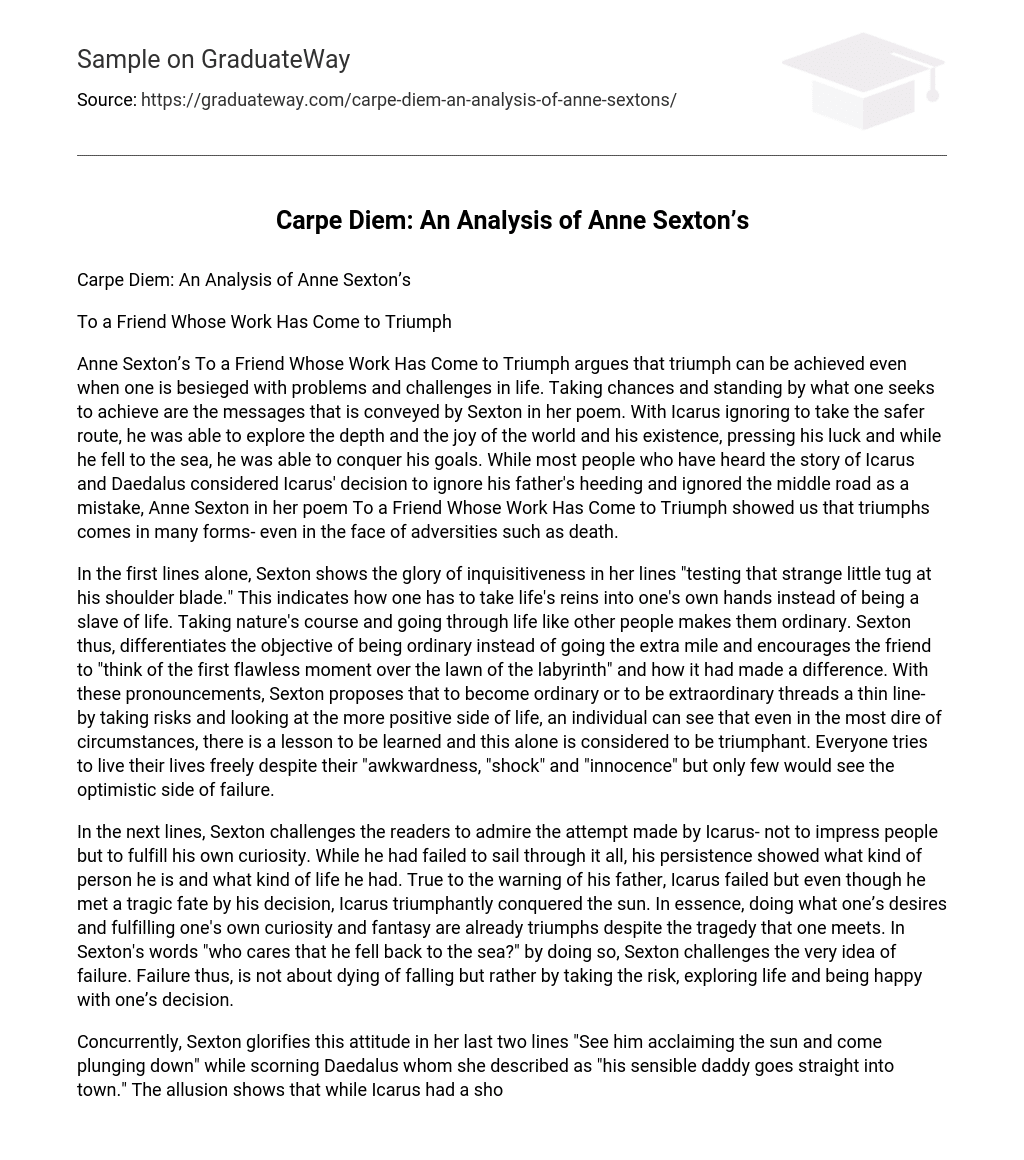To a Friend Whose Work Has Come to Triumph
Anne Sexton’s To a Friend Whose Work Has Come to Triumph argues that triumph can be achieved even when one is besieged with problems and challenges in life. Taking chances and standing by what one seeks to achieve are the messages that is conveyed by Sexton in her poem. With Icarus ignoring to take the safer route, he was able to explore the depth and the joy of the world and his existence, pressing his luck and while he fell to the sea, he was able to conquer his goals. While most people who have heard the story of Icarus and Daedalus considered Icarus’ decision to ignore his father’s heeding and ignored the middle road as a mistake, Anne Sexton in her poem To a Friend Whose Work Has Come to Triumph showed us that triumphs comes in many forms- even in the face of adversities such as death.
In the first lines alone, Sexton shows the glory of inquisitiveness in her lines “testing that strange little tug at his shoulder blade.” This indicates how one has to take life’s reins into one’s own hands instead of being a slave of life. Taking nature’s course and going through life like other people makes them ordinary. Sexton thus, differentiates the objective of being ordinary instead of going the extra mile and encourages the friend to “think of the first flawless moment over the lawn of the labyrinth” and how it had made a difference. With these pronouncements, Sexton proposes that to become ordinary or to be extraordinary threads a thin line- by taking risks and looking at the more positive side of life, an individual can see that even in the most dire of circumstances, there is a lesson to be learned and this alone is considered to be triumphant. Everyone tries to live their lives freely despite their “awkwardness, “shock” and “innocence” but only few would see the optimistic side of failure.
In the next lines, Sexton challenges the readers to admire the attempt made by Icarus- not to impress people but to fulfill his own curiosity. While he had failed to sail through it all, his persistence showed what kind of person he is and what kind of life he had. True to the warning of his father, Icarus failed but even though he met a tragic fate by his decision, Icarus triumphantly conquered the sun. In essence, doing what one’s desires and fulfilling one’s own curiosity and fantasy are already triumphs despite the tragedy that one meets. In Sexton’s words “who cares that he fell back to the sea?” by doing so, Sexton challenges the very idea of failure. Failure thus, is not about dying of falling but rather by taking the risk, exploring life and being happy with one’s decision.
Concurrently, Sexton glorifies this attitude in her last two lines “See him acclaiming the sun and come plunging down” while scorning Daedalus whom she described as “his sensible daddy goes straight into town.” The allusion shows that while Icarus had a short life, he is shown to be contented with the decision that he had made.
Life presents choices- while some can sail through it scratch-free or others can choose to live it up and seize the day. While the literature has been harsh on the decision of Icarus to follow what he wanted, Sexton shows a different angle: Icarus gloriously taking the challenge and living his life. To a Friend Whose Work Has Come to Triumph essentially challenges people to consider the concept of failures and triumphs in life. Oftentimes, triumphs include the fulfillment one achieves in pursuing their goals in life.





